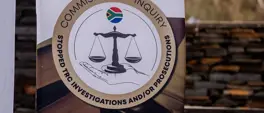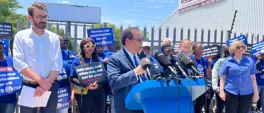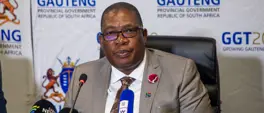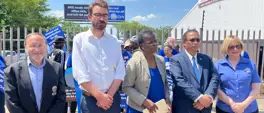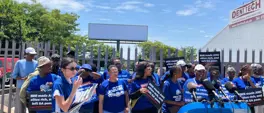ANALYSIS: Tax reform, inequality and climate change dominate G20 Social Summit
Malaika Mahlatsi
17 November 2024 | 14:59As inequality continues to rise, time may be running out for G20 countries to meaningfully change the trajectory of global inequality, writes Malaika Mahlatsi.
As rain poured in Rio de Janeiro on Saturday morning, scores of civil society organisations gathered near Copacabana beach marching against global inequalities, tax reform, the unfolding genocide in Palestine and climate change.
Not too far away, in the heart of Porto Maravilha, the president of Brazil, Luiz Inácio Lula da Silva, was giving an address at the closing ceremony of the G20 Social Summit.
The G20 Social Summit precedes the G20 Summit and is a gathering of civil society organisations. G20 Social was announced by President Lula at the 18th Summit of Heads of Government and State of the G20, in New Delhi, India, when Brazil symbolically assumed the presidency of the bloc.
The objective of the G20 Social is to increase the participation of non-governmental actors in the activities and decision-making processes of the G20. The G20 Social ensures space for the different voices, struggles and demands of the populations and non-governmental actors of the countries that make up the world's largest economies.
Thus, it intends for the contributions of civil society to be analysed and, where appropriate and where there is consensus, incorporated into the Leaders' Declaration. The 13 engagement groups that are part of the G20 Social are: C20 (civil society); T20 (think tanks); Y20 (youth); W20 (women); L20 (work/labour); U20 (cities/municipalities); B20 (business); S20 (sciences); Startup20 (startups); P20 (parliaments); SAI20 (courts of auditors); and the newest J20 (supreme courts) and O20 (oceans).
In addition to the activities developed by the 13 engagement groups, the G20 Social also includes meetings between the political (Sherpa Track), financial (Finance Track) and engagement groups.
Inequality, which was a key focus of the Brazil G20 presidency, was a highlight of discussions at the G20 Social, with many civil society organisations contending that it is worsening.
Over half the world’s poorest people live in G20 countries, and rising inequality threatens to prevent them benefiting from economic growth. Income inequality is growing in almost all G20 countries, even while it is falling in many low and lower middle income countries. Only four G20 countries – including just one high-income country, South Korea – have reduced income inequality since 1990.
Addressing a panel on Financial Integrity for Sustainable Development and Inequality Reduction, the executive director of Oxfam South Africa, Lebogang Ramafoko, shared research findings that indicate overwhelmingly that inequality is detrimental to economic growth itself.
She contended that inequality leads to instability, prevents productive investment and undermines institutions of government, adding that protests emerging around the world show the extent to which citizens are concerned about inequality’s corrosive power.
Inequality was also the topic of discussion in various panels. Speakers in the Building Caring Societies Across the G20 and Beyond reflected on the need for G20 countries to prioritise the care economy, arguing women are disenfranchised by the devaluing of the work they do in the reproductive space.
Inequality was also linked to climate change. G20 countries alone consume almost all the natural resources that the planet is capable of replenishing each year. The G20’s high-income countries have on the whole performed very poorly. Only four G20 countries have reduced their carbon emissions since the Rio Summit in 1992. The dangerous climate change and environmental degradation that results hits the poor hardest.
The poor not only depend most on natural resources for their livelihoods, but also tend to live in places disproportionately affected by climate change. They can also lack the rights or power to secure access to resources in times of scarcity.
Civil society organisations collectively agree that the reform of the global financial system is crucial to alleviating inequality. According to Ramafoko, the most important outcome of the G20 Social in the Finance Track has been the development of the Civil Society Recommendations on International Taxation for G20 Finance Ministers.
At the centre of these recommendations is: incorporating human rights, socio environmental and climate obligations as overarching principles to guide and inform tax decision-making; decolonising standards on taxation by adopting criteria and measures which promote equity between countries, jurisdictions and regions, and compensating developmental differences and imbalances of power; as well as incorporating a gender and race/ethnicity approach to tax policies to fight gender and race/ethnicity inequalities.
As South Africa assumes the presidency of G20 in the coming few weeks, civil society organisations such as Oxfam International are proposing it should prioritise shifting resources from tax incentives for fossil fuels to the fight against hunger, climate change, poverty and inequality, and to promote climate justice and just energy transition.
It is proposed that the elimination of tax incentives for fossil fuels should be done after assessing and addressing the impacts of these measures on lower-income groups, and paired with appropriate compensatory mechanisms, to prevent or mitigate its potentially regressive impacts.
Tax reform, alongside the cancellation of debt for developing nations, has been an ongoing struggle for civil society organisations. And while the pace of change has been glacial, there are indications that the world is starting to pay attention.
Specifically, the recommendation to include in the United Nations Framework Convention on International Tax Cooperation (UNFCITC) the creation of a global minimum tax on the super-rich is being discussed by various governments.
Just three days ago, the National Treasury confirmed to Parliament it is exploring the feasibility of a wealth tax. In collaboration with the South African Revenue Service (SARS), the National Treasury is analysing data on declared wealth to better understand its distribution.
If a wealth tax is introduced in South Africa, it could go a long way in putting pressure on other G20 countries to follow suit.
As inequality continues to rise, time may be running out for G20 countries to meaningfully change the trajectory of global inequality.
Malaika is a researcher and geography at the Institute for Pan African Thought and Conversation. She is providing analysis from Brazil, where she is attending the G20 Social Summit and G20 Summit.
Trending News
More in Opinion
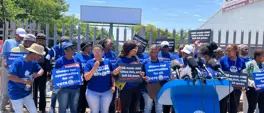
28 October 2025 14:19
CHARLES MATSEKE | The R1 Trillion myth: When Populism and media performance replace journalism
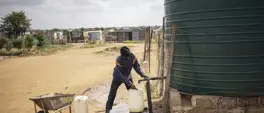
28 October 2025 13:46
OBAKENG RAMABODU | Building our own capacity is the only way to fix Tshwane water crisis

27 October 2025 08:08
JAMIL F. KHAN | The dangerous privilege behind claims that spatial apartheid no longer exists in Cape Town

